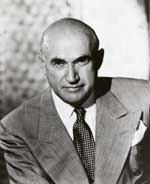

| Barney Balaban | Louis B. Mayer |
| James F. Byrnes | Dore Schary |
| Harry Cohn | "General" Nicholas Schenck |
| William Goetz | Mendel Silberberg |
| Samuel Goldwyn | Spyros Skouras |
| Eric Johnston | "Major" Albert Warner |

"As an American," producer Samuel Goldwyn had planned to tell HUAC which, when they got wind of what he planned to say, declined to call him to testify, "I have been astounded and outraged at the manner in which the committee has permitted our industry to be vilified by gossip, innuendo and hearsay. I had hoped that a Committee of Congress would be sufficiently aware of the traditions and background of American democracy so that it would not permit itself to be used as a sounding board for a smear campaign intended to destroy public confidence in the integrity of an industry which so many of us have spent the best years of our lives (sic) building up. The most un-American activity which I have observed in connection with the hearings has been the activity of the Committee itself. The purpose of these hearings seems to have been to try to dictate and control what goes on the screens of America. I resent and abhor censorship of thought. I assure you that as long as I live no one will ever be able to dictate what I put on the screen so long as I continue to honor and obey the laws of our country."
Goldwyn had formulated his own policy statement the day before the Waldorf Conference and entered the room knowing that his colleagues had already decided to adopt a more subservient ploy.
Born Schmuel Gelbfish in Eastern Europe, Goldwyn — he invented the name by combining his Anglicized "Goldfish" with the "Selwyn" of an early business partner — was a loner, even among others. A man of taste (which many attributed to his young second wife, Frances) and the courage to spend his own money to achieve it, he was also highly idiosyncratic.
Goldwyn was the producer of "The North Star" and "The Best Years of Our Lives," the former of which it has consistently been rumored was requested by the White House and the latter of which Goldwyn later said, as Blacklist fever spread, "I would not be allowed to make today. “The Best Years of Our Lives had won the Oscar® as Best Picture of 1946 in ceremonies on March 12, 1947. That night Goldwyn also won the Thalberg award (presented by Donald Nelson). Speaking of Best Years, Goldwyn announces that what the public wants is more serious and meaningful films (Spyros Skouras, for one, agrees). The "habits" of the audience are changing, and going to the movies should be an "event." "People are shopping" for films now. He foresees the day when the audience of the future "will arrive at theaters on time to see the beginning of a picture, just as they do a play."
Goldwyn's biographer, A. Scott Berg, asserts that about the time he turned 65 (1944), Goldwyn became consumed with creating his image as "the Great Goldwyn." Previously he had hired Hollywood's finest gag writers for his films and not objecting to letting them loose on him, inventing "Goldwynisms" that won him column space even as they perforated his dignity. It wasn't until Sam, Junior, began getting ribbed at school about his illiterate-sounding father that Goldwyn hired PR man Benjamin Sonnenberg to seek a more refined image in the press. He confided to his therapist, "I hate my mouth" and was told pointedly that he had to choose between being a master of Goldwynisms or a slave to them; it was a simple matter of self-esteem. Despite this, at a party at Elsa Maxwell's in which each guest was asked to write his own epitaph, Goldwyn still wrote "Include me out."